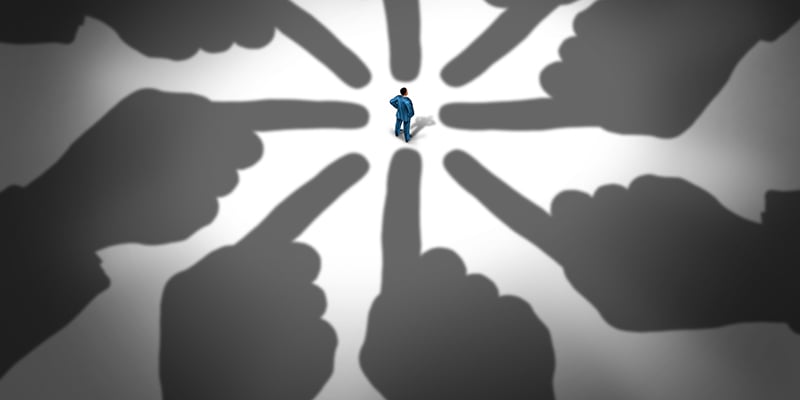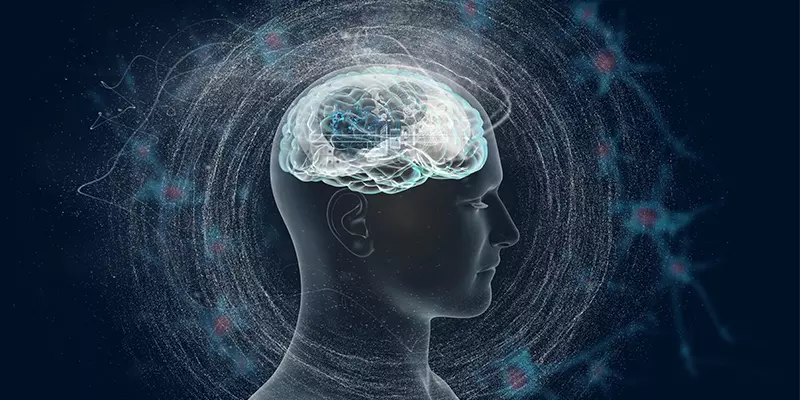
After 40 years of psychiatric practice with tens of thousands of patients at Amen Clinics, it has become clear that there’s one self-defeating behavior that is guaranteed to ruin your life. What is it?
Blaming others.
These days, there’s a tsunami of blame going around. Just scroll through your social media feed, and you’ll find angry, anxious, helpless, and sad posts from people blaming someone else for their current situation. Heck, you may even be one of those people posting about how others are to blame for your misfortune. But this is not helpful. In fact, it’s toxic thinking.
Why Blame is so Toxic
The tendency to blame others when things go wrong in your life is a hallmark of self-sabotage. It means that when anything goes wrong in your work life, in your relationship, or with your health, you’re quick to say it’s somebody else’s fault.
But blame triggers a dangerous downward spiral that leads to inaction and helplessness that just makes things worse. Here’s how it goes:
1. You blame others.
“It’s your fault.”
2. You start to view your life as being out of your own control.
“My life would be better if it wasn’t for…”
3. You feel like a victim of circumstances.
“If only that didn’t happen, then I….”
4. You feel helpless and give up trying to change things.
“Nothing will ever go right for me, so why bother trying?”
Blaming others feels good at first. It basically absolves you of any feelings of guilt or responsibility for the things that are going wrong in your life. However, it also reinforces the idea that your life is out of your control and that others can determine how life goes for you. This is disempowering and causes much inner turmoil. Eventually, by giving up on trying to change things, it can lead to even greater problems in your life. Your career goes nowhere, your relationship disintegrates, or your health deteriorates. It can also lead to feelings of anxiety and depression.
Blame is a Sign of Toxic Thinking
Blaming others is a type of ANT (automatic negative thoughts) that infests your mind and ruins your day and your life. Of all the types of ANTs (there are at least 9 types of self-defeating ANTs), Blaming ANTs are the most toxic. They not only steal your happiness but also drain your personal power.
Is your mind ruled by Blaming ANTs? Ask yourself if you have a tendency to say things like:
1. “It’s their fault that COVID-19 infections are going up in my area.”
2. “It’s their fault I lost my job.”
3. “It’s not my fault I eat too much; my mom taught me to clean my plate.”
4. “I’m having trouble meeting this deadline because the client keeps changing his mind. I’m miserable, and it’s all his fault!”
5. “It’s my boss’ fault I did not get promoted.”
6. “It’s my child’s fault.”
7. “It wasn’t my fault that [I wasn’t prepared for the meeting, they never give enough notice, etc.]”
8. “That wouldn’t have happened if you had been better to me.”
9. “How was I supposed to know [the boss wanted the reports in two days. He should have told me, etc.].”
10. “If it was so important, why didn’t you remind me?”
Stop Blaming, Start Taking Responsibility
In order to break free from the Blaming ANTs, you have to start taking responsibility. Rather than automatically placing blame on others, ask yourself this simple question:
“What can I do today to make things better?”
Think about things you can do to make yourself more valuable at work, to make your relationships better, to improve your health and well-being, to make your thinking more rational, and to make your brain healthier?
For example, at Amen Clinics, patients with relationship issues often tend to blame the other person. But when they look at their own behavior and admit that there are things they do that drive their partner crazy, it helps them stop the blame game. Then when they think about what they do that makes their partner happy, they can take ownership of their behavior and choose to do the things that make their partner smile. It makes them feel empowered to enhance their relationship with their words and actions.
Responsibility isn’t about taking the blame for everything, rather it’s about your ability to respond to whatever situation you’re in. Even in a pandemic when you may feel like so much is out of your control, you can still take responsibility for your own actions.
Make today the day you commit to stop blaming others and start asking what you can do today that will make the biggest positive difference in your work life, your relationships, and your brain and body health. After all, don’t you want to be in the driver’s seat of your own life?
Anxiety, depression, ADD, memory loss, and other mental health issues can’t wait. During these uncertain times, your mental well-being is more important than ever, and waiting until life gets back to “normal” is likely to make your symptoms worsen over time.
At Amen Clinics, we’re here for you. We offer in-clinic brain scanning and appointments, as well as mental telehealth, remote clinical evaluations, and video therapy for adults, children, and couples. Find out more by speaking to a specialist today at 888-288-9834. If all our specialists are busy helping others, you can also schedule a time to talk.





I guess this is one of my ANTS. Even as I read this, I can’t help but think “sometimes people do terrible things and it IS their fault”. I get it that we shouldn’t always blame construction for being late to every appointment. But sometimes there are reasons beyond our control. Especially when dealing with people. Maybe we have quirks and one person would laugh and work with you in a loving way. Where another person may act unkindly and emotionally abusive. Of course many would say to remove yourself from that situation but then we have to weigh the cost. Do you give up your job, income, your house, a stable financial future? Sometimes we find ourselves paired with jerks. And sometimes people truly are victims. Perhaps a partner is a narcissist. Perhaps there is an illness or injury that makes working difficult. Certainly we each contribute in some way to a bad situation, but sometimes that contribution is not equal. And sometimes circumstances are really crappy and beyond our control.
I don’t feel like this article can be equally applied to everyone. This article also assumes that people aren’t insensitive jerks or perhaps if they are it’s their targets fault. I don’t think the ideas here are completely wrong. But I don’t think it’s well-rounded. It comes from a perspective of a person who has power. Probably has hard work and luck that’s lead to it. Not everyone has the fortitude to be an inspiring comeback story if they’ve lost or never had power. When people have good luck, we don’t call them a victim of circumstances. Why do we do so for those who’ve had unlucky circumstances?
Comment by Hello — July 15, 2020 @ 2:49 AM
All politicans should memorize this article on blame!!!! How arrogant we have become!! Read A NATION OF SHEEP by LEderer!
Comment by Dr. J. — July 15, 2020 @ 4:59 AM
Tell the President he is setting the model and normalized behavior!
Comment by Robert — July 15, 2020 @ 6:34 AM
keep all this coming dr. Amen. We all need to hear this consistently amd persistently. It takes SO MUCH COURAGE in the self to not project out and blame others. I wish i were close to you amd your church so I could be a part of your good leadership and help there. It is lonely out here trying to take 100% responsibility for self 100% of the time. Thanks for being “out there”.
Comment by Kathlern spike — July 15, 2020 @ 6:41 AM
Great information!
Thank you for such great insight
Comment by Susan K. Ritter — July 15, 2020 @ 7:20 AM
Thanks for this great article on blaming others and what can happen when you flip your thoughts and take responsibility. As a practitioner in the Corporate Training and Organization Development field, I’ve met many people who struggle on being effective in their job roles because they are stuck on blaming someone or something else for what is going on. They are waiting for someone else to fix their situation.
Regarding responsibility and being in the driver’s seat of your own life, I’ve come to the realization that “you really gotta wanna.” You have to DECIDE that you want to make things better, and then, do what you have decided. Until people DECIDE and then follow through, nothing changes. Except maybe in the work world, when bosses and leaders DECIDE that blamers and people who don’t take responsibility detract from business, instead of supporting it, and change you out of your role and your job.
Comment by Rose J. — July 15, 2020 @ 8:12 AM
Another humorous article…
What in the world did you think would happen? We have emasculated any male that demonstrates masculinity, devalued any woman who praises the great contribution of motherhood, eliminated the value of the family unit (a biologically correct mother and father) (especially in minority communities), encouraged & praise divorce, laughed at traditional religion, sent our children to day care to enable mommies & daddies to find their individual happy place, and lastly, forced our senior family members into cloistered death communities…Then you ask our little marshmallow adults why they believe, “My life would be better if it wasn’t for…(whatever)…
The individuals that remain connected to God, family, traditional values and strong morals, understand that life is not about being a victim…They have accepted their privilege…And you may ask what “privilege” am I referring too? The privilege of being born in or brought to the greatest country in the world (not perfect but always working to improve) that has provided an opportunity to live free and WORK for success…Yes, I included a four letter word banished from our current lexicon…WORK…Something my immigrant grandfathers and grandmothers understood clearly when they jumped off the boat in America…They had nothing, were discriminated against, started at the bottom in all jobs (when they could get them), stayed together and ended with a happy life…not rich, not influential, but happy in their & children’s mind…Also, sent and paid for their children to get additional education…Not a government handout…
Continue throwing free things at individuals and you will continue to get VICTIMS.
Comment by Dr. Henry Sinopoli — July 15, 2020 @ 9:35 AM
I’m not a doctor, but I follow Dr Amen’s discussions through the online medical network, and as a caregiver/representative for someone with a chronic illness for over 26 years, I can only endorse what I have heard from he has had to say.
Thus it is my surprise at how arrogant the prior post by Dr Sinopoli comes across.
While he initially has some valid observations about society, I bet he has never been in the position where he has been a caregiver for someone for any duration of time?!
His attitude is typical of the academic ivory tower arrogance which has caused the very problems we have in society with chronic mental illness and its stigma.
Get a life and learn to be part of the solution by taking initiative and caring for someone I say instead of your negativity!!
Comment by David Turner — July 15, 2020 @ 9:58 AM
I thought that this was about blaming YOURSELF for everything that goes wrong. I think I take too much responsibility for the obstacles in my life. “If I was better at life, I would be able to cope with obstacles.” If something happens in my family I feel like that was my fault too. I blame myself for things that are beyond anyone’s control.
Maybe you could address people with the opposite problem of blaming others.
Thanks- Tracy
Comment by Tracy Short — July 15, 2020 @ 12:21 PM
Your comment sounds all too familiar to me. I used to blame traffic, actions of others, etc. and didn’t realize how negatively it affected me. It was also frustrating when I vented to a trusted party, and they responded “Well, if you had done this or that…” When I began understanding what was within my control (to leave earlier, ask for a specific deadline, etc.) it helped tremendously, and allowed me to be more forgiving of others and myself. I try not to think of things in terms of right and wrong, and my boundaries allow me to give the benefit of the doubt without feeling taken advantage of. Hope you are able to find/create your blameless positivity path.!
Comment by Kelly — July 17, 2020 @ 1:15 PM
I agree. For the most part I think we should always try to take responsibility for everything that we can. But a perfect example is the systemic racism in this country and the fact that those in power set it up for them to get richer and obtain more power while poor people and POC are being controlled in minimum wage jobs and being forced to deal with abuse because of their position in life with no power. Do as much as you can that is in your control and use your voice, and your vote, ask for help when possible, and to try to change the things you can.
Comment by Sheryl Pickeirng — July 17, 2020 @ 2:50 PM
I believe what the article is talking about is self-responsibility. Although we are not responsible for what is external to us, we do have the choice to decide how we react to what happens. Our feelings, reactions, decisions, moods, all depend on us and are our responsibility. Looking at the situation and asking ourselves “What am I responsible here?” rather than blaming whatever or whoever gives us the possibility to do something about it. We can empower ourselves and regain control of our lives.
Comment by Emma — August 7, 2020 @ 4:17 AM
I believe what the article is talking about is self-responsibility. Although we are not responsible for what is external to us, we do have the choice to decide how we react to what happens. Our feelings, reactions, decisions, moods, all depend on us and are our responsibility. Looking at the situation and asking ourselves “What am I responsible here?” rather than blaming whatever or whoever gives us the possibility to do something about it. We can empower ourselves and regain control of our lives.
Comment by Emma — August 7, 2020 @ 4:19 AM
If people really are at fault, they should be blamed. Why should an individual suffer from mistreatment from others? Telling an abuse victim to take blame for his/her action because he/she snapped out because of the abuser is only partly his/her fault. So the author of this article should stop blaming the ones who blame and start taking responsibility to look for alternatives instead of preaching it. So any individual's condition is partly his/her fault and partly because of external factors including other people. It is often a fight of free will and determinism inside the brain (this particular sentence has no resources to back it up).
Comment by Reader — December 2, 2022 @ 2:32 AM
This article assumes people who have been greatly aggrieved by others should automatically know how to respond in a constructive way. Unfortunately, the grief and trauma caused by some people’s actions are so extreme that this isn’t even a possibility. Have you heard of post-traumatic stress disorder? I find this article incredibly sensitive to people have lived through extreme trauma or even just bullying and other everyday types of trauma. They should not be made to feel responsible. I feel this article has been written by someone who has always been the perpetrator rather than the recipient of poor treatment. Perhaps you are trying to exonerative yourself in your own personal situations where you have perpetrated it but want the recipient to not blame you. Surely a responsible psychologist would not be giving this sort of insensitive advice to people who should never be blaming themselves.
Comment by Ulla — January 31, 2023 @ 6:35 PM
You say to note what makes the other person happy, and do that. Isn't that codependence? If I am depressed and anxious since the age of 8, is it because I am "driving others crazy" as you say? I think suffering and imperfection are simply of life. You can't hope to have good relationships by always pleasing the other person. Nor by blaming them. Yes, you can make better decisions. You can learn coping techniques and meditation and all sorts of things that help. But please…don't tell people to figure out what makes the other person happy. There are too many who jump on the chance to use people who offer themselves as a sacrifice.
Comment by Donna — January 28, 2024 @ 7:44 PM